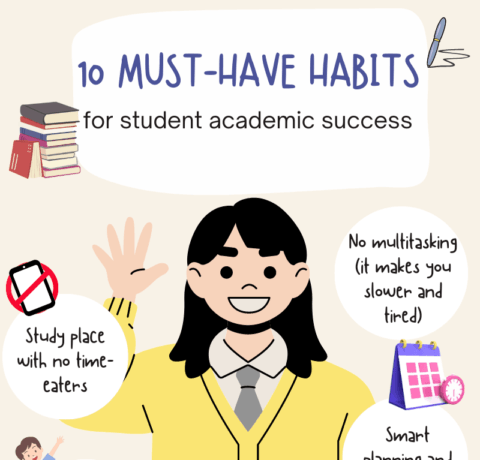"STUDY MASTER FOCUS, LEARN,SUCCEED"
1. Introduction
3. Effective Study Techniques
Active Recall Spaced Repetition Pomodoro Technique Mind Mapping & Visual Aids Prioritize Tasks Create a Study Schedule Avoiding Procrastination Sleep Nutrition Exercise Study Apps Online Resources Collaborative Tools Recognizing Stress Coping Mechanisms Seeking Support
Self-Assessment Iterate and Improve Celebrating Milestones
Recap of study smarter techniques Encouragement to start implementing changes Call-to-action: share tips or experiences in the comments
- Importance of efficient studying
- What it means to study smarter
- Overview of blog content
- Space: Create a distraction-free zone
- Lighting: Importance of natural light or adjustable lighting
- Organization: Tools for organized study (e.g., desk, folders, apps)
- Noise Control: Use of earplugs, noise-cancelling headphones, or soft music
3. Effective Study Techniques
- Explanation of active recall
- Benefits (memory retention, deeper understanding)
- Tips on using flashcards or self-quizzing
- How spacing out review sessions enhances learning
- Tools like Anki or Quizlet for scheduling repetitions
- Short focused study intervals (25 min) followed by breaks (5 min)
- Benefits (enhanced focus, reduced mental fatigue)
- Using mind maps to organize information
- Visual tools (diagrams, charts, color-coding)
- Identifying high-impact tasks
- Eisenhower Matrix (urgent vs. important)
- Benefits of daily/weekly planning
- Tools (Google Calendar, study planner apps)
- Techniques (5-minute rule, breaking down tasks)
- Motivation hacks (reward systems, accountability)
- How sleep affects memory and focus
- Optimal sleep duration for students
- Brain foods (omega-3s, antioxidants)
- Hydration and its role in mental performance
- Benefits of physical activity for cognitive function
- Simple routines to integrate during study breaks
6. Leveraging Technology for Smarter Study
- Productivity apps (Notion, Evernote)
- Focus apps (Forest, Focus@Will)
- Pomodoro timers (Be Focused, Focus Booster)
- YouTube educational channels
- Online courses (Coursera, Khan Academy)
- Group study platforms (Google Docs, Slack, Zoom)
7. Dealing with Stress and Burnout
- Signs of burnout or overwhelm
- Mindfulness, breathing exercises, meditation
- Time for hobbies and relaxation
- Study groups, tutoring, mental health resources
8. Review and Reflect
- Evaluating progress and understanding
- Adjusting study strategies based on results
- Rewarding progress to stay motivated
9. Conclusion

_(1).jpg?1583785243)

Comments
Post a Comment